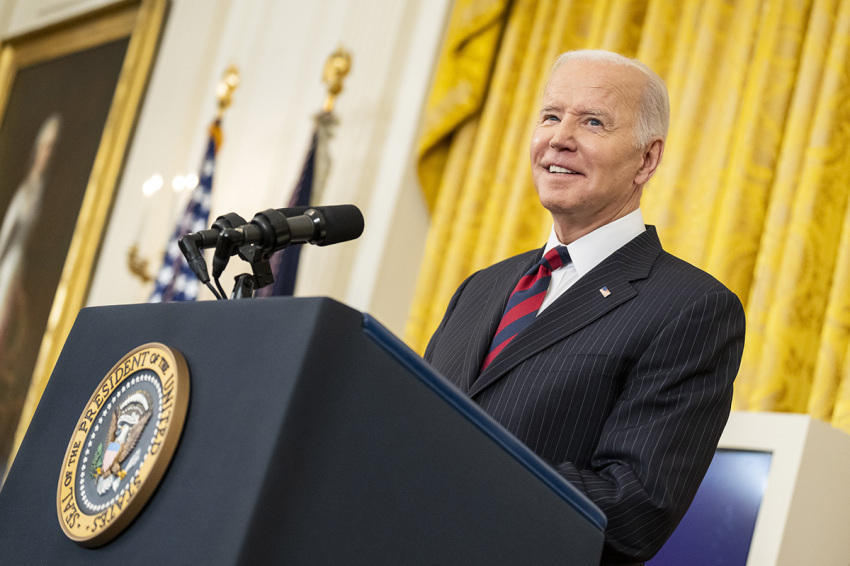Biden seeks 'exception' to the filibuster rule to codify Roe into federal law

President Joe Biden is calling on the U.S. Senate to "make an exception to" the filibuster rule to ensure the passage of a bill codifying the right to abortion into federal law.
Biden discussed abortion at a press conference in Madrid, Spain, following the 2022 NATO Summit on Thursday.
"I believe we have to codify Roe v. Wade into law, and the way to do that is to make sure that Congress votes to do that," Biden said.
He urged the U.S. Senate to make "an exception to the filibuster for this action to deal with the Supreme Court decision."
The comment comes days after the U.S. Supreme Court ruled in Dobbs v. Jackson Women's Health Organization that the Constitution does not contain a right to abortion. The ruling gives each state the ability to set laws regulating the procedure and reverses the 1973 Roe v. Wade decision that legalized abortion nationwide.
Biden sees the court's decision as troubling for the "right to privacy, not just abortion rights."
"I really think that it’s a serious, serious problem that the Court has thrust upon the United States not just in terms of the right to choose, but in terms of the right to who you can marry, the right — a whole range of issues relating to — to privacy," Biden said.
"I have written, way back, a number of law review articles about the Ninth Amendment and the — and the Fourteenth Amendment and why that privacy is considered as part of a constitutional guarantee. And the — they’ve just wiped it all out."
BREAKING: Joe Biden calls for eliminating the filibuster to codify Roe v. Wade
— Benny Johnson (@bennyjohnson) June 30, 2022
pic.twitter.com/PVih8qG2jJ
The filibuster rule requires most legislation in the U.S. Senate to receive 60 votes before the debate is ended on a bill. Making an "exception to" the filibuster would allow legislation to become law with a simple majority. Any changes to Senate procedure would require the support of a majority of senators.
The Democrat-controlled House of Representatives passed the Women's Health Protection Act in September, but the bill has failed to become law because of opposition from the evenly divided Senate.
The most recent vote on the Women's Health Protection Act in the Senate failed to receive the support of a majority of senators even though Vice President Kamala Harris' tie-breaking vote gave them a majority in the upper chamber. Sen. Joe Manchin, D-W.Va., joined all Republicans in voting against the measure.
Marjorie Dannenfelser, president of the pro-life grassroots organization Susan B. Anthony Pro-Life America, criticized the president's call to make an exception to the filibuster.
"Joe Biden has caved to the abortion lobby, calling for an end to the filibuster so that Democrats can pass an extreme bill forcing abortion on demand up until birth on all 50 states, even painful late-term abortions," Dannenfelser said in a statement.
House Speaker Nancy Pelosi, D-Calif., suggested that another vote will take place on the Women's Health Protection Act following the Dobbs decision.
In a letter to her Democratic colleagues published Monday, Pelosi announced, "Our Caucus has been exploring avenues to protect the health and freedom of American women."
In response to the Dobbs ruling, Pelosi had previously vowed to "keep fighting ferociously to enshrine Roe v. Wade into law."
Pelosi maintains that "the rights of women and all Americans" are on the ballot for the 2022 midterm elections as a continued Democratic majority in the House and an expanded Democratic majority in the Senate are needed to pass the Women's Health Protection Act.
The RealClearPolitics average of polls asking Americans whether they would vote for a Republican candidate or Democratic candidate in the midterms shows Americans prefer Republicans by 2.2 percentage points.
Dannenfelser decried Pelosi's effort to pass the Women's Health Protection Act as an effort to "roll back the people's victory and impose abortion on demand until the moment of birth nationwide." She argues that the Democratic late-term abortion stance is "deeply unpopular and a liability in this pivotal election year."
Following the Dobbs decision, several states have banned abortion, including Missouri, Oklahoma, Alabama, Arkansas and Mississippi. Additionally, South Carolina's heartbeat bill prohibiting abortions after six weeks of gestation has gone into effect. Additional abortion bans went into effect in Kentucky, Louisiana and Utah, but lower court judges have placed them on hold.
While a total of 21 states already have or are expected to ban or severely restrict abortion, 16 states will continue to allow abortions throughout most or all of pregnancy as they have codified the right to abortion into state law. An additional 10 states will likely continue enforcing existing abortion laws unless and until their state legislatures pass new ones and the remaining three states could let voters determine abortion policy at the ballot box.
Ryan Foley is a reporter for The Christian Post. He can be reached at: ryan.foley@christianpost.com



























